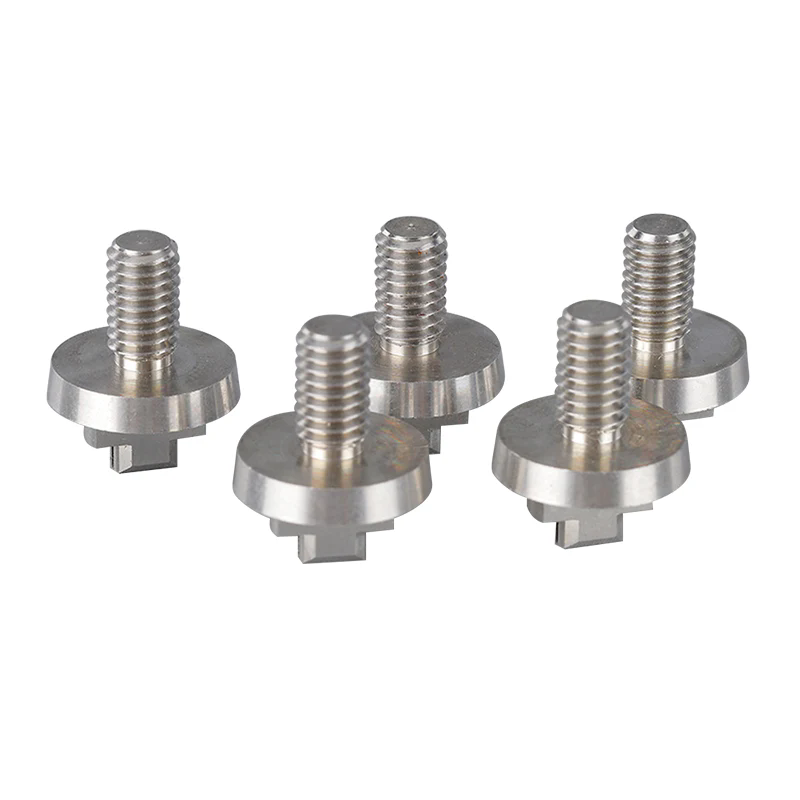How Do Automotive Nut Fasteners Improve Vehicle Safety and Performance?
2025-10-10
Automotive nut fasteners are among the most crucial yet overlooked components in the modern vehicle manufacturing industry. They are used to securely connect different automotive parts—such as chassis, suspension systems, engines, wheels, and brake assemblies—ensuring both safety and stability during operation. Although small in size, these fasteners play a huge role in determining the overall reliability, safety, and longevity of a vehicle.
What are automotive nut fasteners exactly?
In the automotive sector, nut fasteners refer to threaded hardware components designed to hold bolts or studs in place. They come in various materials and configurations to suit different environments, stress levels, and thermal conditions. The main goal of these components is to maintain a secure mechanical joint even under extreme vibration, temperature fluctuations, and heavy load conditions common in automotive applications.
Common Types of Automotive Nut Fasteners
Automotive nut fasteners can be categorized based on their design, material, and application. Below is a table summarizing the most widely used types:
| Type | Description | Common Applications |
|---|---|---|
| Hex Nuts | Six-sided nuts offering strong torque resistance | General automotive assembly, engine mounts |
| Flange Nuts | Built-in washer for load distribution | Suspension systems, wheel hubs |
| Lock Nuts | Feature nylon insert or metal lock to prevent loosening | High-vibration areas such as engine components |
| Wing Nuts | Allow manual tightening without tools | Temporary fittings or interior panels |
| Cap Nuts | Closed-end nuts for protection against corrosion | Exposed exterior fittings, decorative trim |
| T-Nuts | Embedded into a surface to provide flush fastening | Vehicle interiors and panel installations |
Material Composition and Surface Treatments
Automotive nut fasteners are manufactured using materials like carbon steel, stainless steel, and alloy steel. In specific high-performance vehicles, titanium and aluminum alloys may also be used due to their lightweight and anti-corrosive properties.
Surface treatments such as zinc plating, black oxide, galvanization, or anodizing further enhance resistance to corrosion and improve fatigue strength, especially in vehicles operating under harsh weather or off-road conditions.
By choosing the right nut fastener, automotive engineers can optimize torque performance, reduce wear on mating parts, and ensure long-term reliability without frequent maintenance.
Why Automotive Nut Fasteners Matter in Vehicle Design and Safety
When analyzing automotive safety, one of the most significant aspects is the integrity of the mechanical joints that hold critical components together. Automotive nut fasteners play a decisive role in this process, serving as the mechanical “guardians” that prevent loosening or component failure under stress.
Why Are They So Important?
-
Structural Integrity:
Fasteners keep the vehicle’s framework rigid and prevent deformation caused by road vibrations and sudden loads. -
Safety Assurance:
Properly installed nuts prevent component detachment during high-speed driving or collisions, thereby protecting both the vehicle and the passengers. -
Vibration Resistance:
Automotive nut fasteners are designed to withstand intense vibration from engines, transmissions, and road impact. Specialized lock nuts or prevailing torque nuts ensure that bolts remain secure under prolonged stress. -
Thermal and Corrosion Resistance:
Engine compartments and exhaust systems are exposed to extreme temperature variations. Heat-treated fasteners or those with anti-corrosive coatings maintain stability in these conditions.
How They Influence Performance
The performance of an automobile is directly influenced by the fasteners used during assembly. For instance:
-
A lightweight alloy nut can reduce the vehicle’s overall mass, improving fuel efficiency.
-
High-tensile steel nuts enhance the ability to withstand torque and load, critical in sports or heavy-duty vehicles.
-
Precision-machined nuts ensure a tight, consistent fit, minimizing friction and energy loss in dynamic components.
Every modern automaker, from passenger cars to commercial vehicles, relies on a tailored mix of nut fasteners to achieve optimal balance between strength, weight, and durability.
How Automotive Nut Fasteners Are Manufactured and Tested
The production of automotive nut fasteners is a complex, precision-driven process that involves advanced metallurgy, machining, and quality control. The goal is not only to achieve the required mechanical properties but also to maintain consistency across thousands of units.
Manufacturing Process Overview
-
Material Selection:
Manufacturers select raw materials based on mechanical strength, corrosion resistance, and cost-effectiveness. -
Cold or Hot Forging:
Nuts are shaped from metal rods using high-pressure forging machines. Cold forging is used for smaller, high-precision nuts, while hot forging is used for larger or specialty ones. -
Thread Rolling:
Threads are formed using dies rather than cutting tools, which enhances strength by improving the grain structure of the metal. -
Heat Treatment:
This process improves tensile strength and fatigue resistance. Quenching and tempering are commonly used. -
Surface Coating:
Coatings like zinc, nickel, or black oxide protect against rust and environmental damage. -
Inspection & Testing:
Advanced inspection systems measure torque performance, dimensional accuracy, and coating adhesion.
Quality Control Standards
Automotive fasteners are produced according to international standards such as:
-
ISO 898 (Mechanical properties of carbon steel fasteners)
-
ISO 965 (Thread tolerances)
-
SAE J995 (American automotive industry standard for nuts)
These standards ensure that every nut meets the required tensile strength, hardness, and fatigue performance benchmarks. Quality assurance labs conduct torque-tension tests, salt spray tests, and fatigue testing to ensure that each batch meets both performance and safety expectations.
Technological Advancements
With modern automation and AI-based quality inspection systems, manufacturers now achieve micron-level precision and real-time quality tracking. CNC machining and robotic assembly lines have drastically reduced human error, resulting in faster production cycles and superior product reliability.
What Makes a Reliable Supplier for Automotive Nut Fasteners?
Choosing the right supplier for automotive nut fasteners is as important as the product itself. A reliable supplier not only provides precision-engineered fasteners but also ensures consistent quality, technical support, and on-time delivery.
Key Qualities to Look for in a Supplier
-
Comprehensive Product Range:
A good supplier offers multiple nut varieties—hex, flange, lock, cap, and custom types—to meet diverse automotive needs. -
Material Expertise:
They should be knowledgeable about metallurgy and capable of providing materials suitable for various performance requirements. -
Quality Certifications:
ISO9001, IATF16949, and RoHS compliance reflect the supplier’s dedication to quality and safety. -
Customization Capability:
The ability to produce custom fasteners tailored to specific designs or environmental demands is critical for advanced automotive engineering. -
After-Sales Support:
Technical support and documentation (such as torque specifications or assembly guidelines) ensure smooth integration into vehicle manufacturing processes.
Product Specifications Overview
| Parameter | Specification Range |
|---|---|
| Thread Size | M4 – M48 |
| Material Options | Carbon Steel, Stainless Steel, Alloy Steel, Titanium |
| Strength Grade | 4.8, 8.8, 10.9, 12.9 |
| Surface Finish | Zinc Plated, Black Oxide, Nickel, Galvanized |
| Standards | ISO, DIN, ANSI, JIS |
| Application | Engine Assembly, Suspension, Chassis, Brake Systems |
These specifications highlight the technical depth and flexibility that professional suppliers offer to meet global automotive manufacturing standards.
Frequently Asked Questions (FAQ)
Q1: What is the difference between standard nuts and automotive nut fasteners?
A1: Standard nuts are used in general machinery or construction, while automotive nut fasteners are designed specifically to handle high vibration, temperature extremes, and mechanical stress found in vehicles. They often feature locking mechanisms or surface treatments to ensure long-term stability.
Q2: How can I ensure my automotive nut fasteners don’t loosen over time?
A2: Proper torque application, the use of lock nuts or thread lockers, and selecting nuts with suitable coatings or materials for the operating environment can prevent loosening. Periodic maintenance and torque checks are also recommended for optimal safety.
Automotive nut fasteners may seem small, but they are indispensable components in every vehicle’s design, playing a crucial role in ensuring safety, structural integrity, and long-term performance. From engine compartments to wheel assemblies, their precision and reliability directly influence vehicle efficiency and stability.
Zhihexing, a trusted name in precision fastener manufacturing, delivers high-quality automotive nut fasteners tailored for global automotive standards. Our advanced production processes, stringent quality control, and commitment to customer satisfaction make us a reliable partner for both OEM and aftermarket applications.
Contact us to learn more about our automotive fastener solutions, request a quotation, or get expert technical advice for your next project.



